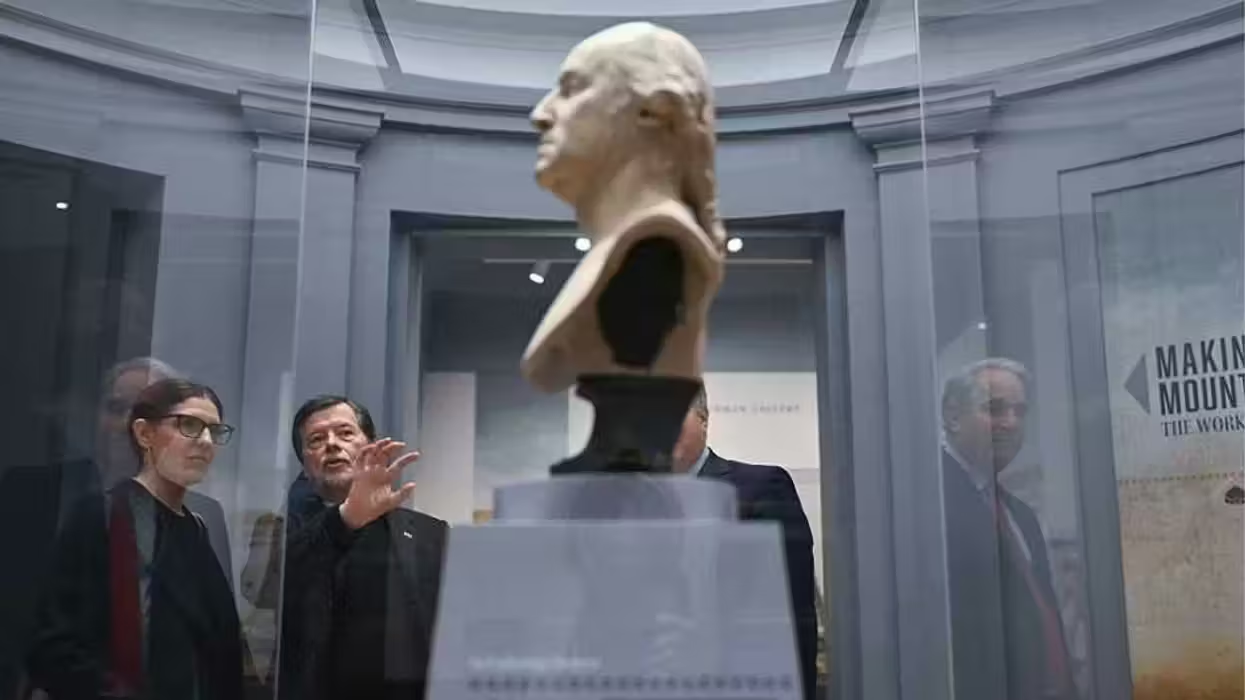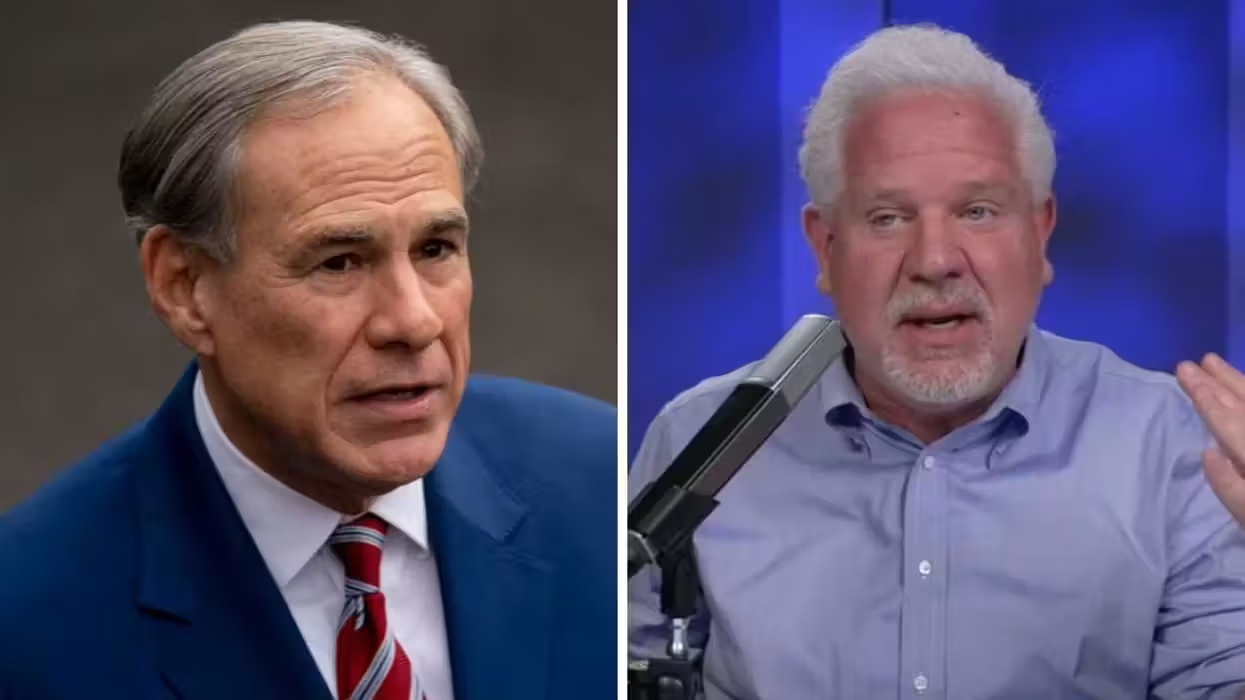
© 2025 Blaze Media LLC. All rights reserved.
Study Concludes Conspiracy Theorists, Free-Market Thinkers Likely to be Global Warming 'Deniers
September 10, 2012
"...conspiracist ideation contributes to the rejection of science."
- A study to be published in Psychological Science has made a link between "climate denialism" -- skepticism of global warming -- and free-market thinking and/or belief in conspiracy theories.
- The survey as conducted through "pro-science" and climate skeptic blogs (none of the latter posted the study).
- Climate deniers have since come out requesting a list of the climate skeptic blogs contacted and have questioned the researchers' methodology.
- The study author calls the skeptic's reaction to his results thus far as "illustrative of exactly the process I was analyzing."

A study conducted by a psychologist from University of Western Australia says it has found a connection between individuals skeptical of man-made global warming -- commonly labeled by opponents as climate "deniers" -- and a tendency to be conspiracy theorists and/or proponents of a free-market economy. But the "deniers" themselves have since been finding what they believe are flaws in this study's methodology and some are even calling for a retraction.
UWA professor Stephan Lewandowsky surveyed more than 1,000 people, according to LiveScience, through science blogs in 2010. His study will be published in Psychological Science, but here it is -- titled NASA Faked the Moon Landing Therefore (Climate) Science Is a Hoax: An Anatomy of the Motivated Rejection of Science -- on the university website.
According to the study's abstract, with bloggers playing an increasingly "influential role in questioning climate science," the researchers contacted science blogs to post a survey in an effort to identify factors that may be associated with climate change acceptance or rejection.
Lewandowsky writes that the study shows "endorsement of the free market" was associated with denying other "established scientific findings," like that smoking causes lung cancer. But even more than being considered a free-market thinker, the study found those who believed in conspiracy theories, like that the CIA killed Martin Luther King or that the moon landing was a setup, was a better predictor of climate denialism.
"This provides empirical [confirmation] of previous suggestions that conspiracist ideation contributes to the rejection of science," he wrote.
The reason Lewandowsky makes the association between free-market thinkers and climate denialism is, in part, based on previous studies that suggest those who "manufacture" doubt have been previously found to have "vested interests" or political motivations in whatever they were denying.
To test the link between climate denialism and a propensity toward free-market support and belief in conspiracy theories, Lewandowky contacted eight "pro-science" blogs and five "skeptic" blogs. None of the skeptic blogs, he notes, posted the link to his voluntary survey. The survey evaluated participants views on climate science and other scientific topics; their economical preferences; belief in a range of conspiracy theories; sensitivities to environmental issues; and their perception of the acceptance among scientists for a variety of scientific issues.
Lewandowsky acknowledges in the study that the blogs chose to host the survey were self-selected and therefore may not reflect the ideals of the population as a whole. This, he writes though, should not render his results negligible as he notes the influence science blogs can have in the climate debate. He also notes that the study itself was to try to identify what motivated climate rejection, not necessarily to represent the population's thoughts as whole.
But not everyone is buying the study.
The popular climate skeptic blog "Watts Up With That" reviewed Lewandowsky's study earlier this month, and like Lewandowsky suggests, Anthony Watts who maintains the blog does take issue with his selection process. Watts criticizes Lewandowsky for not contacting any of the mainstream skeptic blogs, including his own. Watts says he reviewed his emails for an invitation to include the survey link and contacted other similar blogs to see if they had received an invitation as well -- they didn't. He also calls Lewandowsky out for not listing the climate skeptic blogs he contacted.
DeSmogBlog (via The Register) reports Lewandowsky saying since publication of his study he has received many requests to release this list. DeSmogBlog writes that since the blogs contacted to post the survey was done assuming privacy, Lewandowsky is waiting for permission from the university's ethics committee and the Australian Psychological Society before giving out the names. Lewandowsky said that although none of the five skeptic blogs contacted posted the study, two did at least respond to receiving the invitation.
Live Science reports Simon James, a blogger with Australian Climate Madness, has submitted a Freedom of Information request to the university for the release of the blogs involved in the study. Live Science also states Lucia Liljegren, a blogger for The Blackboard, has been encouraging skeptic blogs that were contacted to come forward in order to "reveal whether [Lewandwosky] really even tried to conduct a balanced survey."
In a separate post, Watts writes on WUWT that it also appears different survey questions may have been provided to different blogs (Note: be sure to check out Watts' full post for more on the evidence he and others believe to have found on this):
If different surveys were sent to different bloggers, and no mention of it was made in the paper or justified in the methodology, then this amounts to purposely biased data from the beginning. UWA may also find grounds for academic misconduct if Lewandowsky purposefully sent different sets of questions based on the type of blog he was inviting.
Watts also criticizes Lewandoswky for discussing the "results" of his study while the survey was still open, which would be considered poor scientific practice. With these and other issues emerging from the paper, Watts writes Lewandowsky's "'moon landing' paper is a full force backfire now" and even calls for a retraction from Psychological Science, which is publishing the study in its upcoming issue.
Based on what I’ve seen so far, it is my opinion that Lewandowsky set out to create the survey data he wanted by manipulation of the survey system through multiple undocumented surveys, incomplete and non-representative sampling, biased survey questions, and essentially no quality control. There weren’t even significant safeguards in place to prevent individuals from taking the survey multiple times, appearing as other identities. There are so many things wrong with this paper that I can’t see it surviving intact.
DeSmogBlog reports Lewandowsky saying the reaction from skeptic blogs to his results is to be expected:
So now there's a conspiracy theory going around that I didn't contact them. It's a perfect, perfect illustration of conspiratorial thinking. It's illustrative of exactly the process I was analysing. People jump to conclusions on the basis of no evidence. I would love to be able to release those emails if given permission, because it means four more people will have egg on their faces. I'm anxiously waiting the permission to release this crucial information because it helps to identify people who engage in conspiratorial thinking rather than just searching their inboxes.
It could also be said though that the study takes a "post hoc ergo procter hoc" approach. The term is Latin for "after this, therefore because of this." It's like saying MTV's "Teen Moms" was taken off air and then teen pregnancies were found to be down and attributing this reduction to the show being cancelled (Note: the show has not been cancelled). The study author seems to be assuming that because someone is found to be a climate denier, it is because of their tendency to be a free-market thinker and/or a conspiracy theorist.
While climate skeptics still await the names of the blogs to be released and others continue to review Lewandowsky's methodology, worth noting are Lewandowsky's suggestions to "reduce in the influence and spread of conspiracy theories." In the study, Lewandowsky points to other researchers who say that one should not target the conspiracy theorists themselves but direct communication toward "potential consumers of theories to inoculate them against accepting such theories."
This story has been updated to correct Anthony Watts' name. Featured image via Shutterstock.com.(H/T: Huffington Post)
Want to leave a tip?
We answer to you. Help keep our content free of advertisers and big tech censorship by leaving a tip today.
Want to join the conversation?
Already a subscriber?
more stories
Sign up for the Blaze newsletter
By signing up, you agree to our Privacy Policy and Terms of Use, and agree to receive content that may sometimes include advertisements. You may opt out at any time.
Related Content
© 2025 Blaze Media LLC. All rights reserved.
Get the stories that matter most delivered directly to your inbox.
By signing up, you agree to our Privacy Policy and Terms of Use, and agree to receive content that may sometimes include advertisements. You may opt out at any time.






